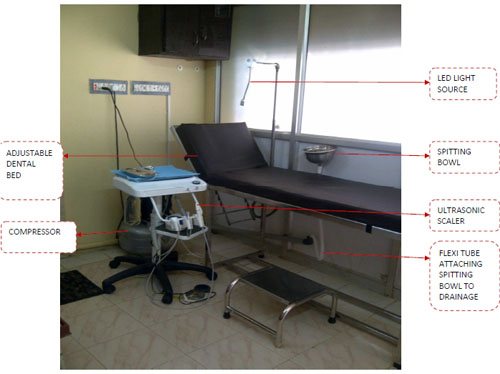By Arun Jithendra, Research Analyst – ICTPH
IKP Centre for Technologies in Public Health (ICTPH) is a not-for-profit research organization with its mission to innovate health-systems for remote rural populations. The four elements defining the ICTPH Health Systems approach are human resource, infrastructure & technology, financing and interventions (Johar, 2010). The healthcare delivery pilot anchored by ICTPH, along with its field partner SughaVazhvu currently has various specialized interventions for Vision, Infant nutrition, Cardio vascular diseases (CVD) and Women’s health.
In our pursuit to offer an integrated primary health care model to the community, the oral health intervention was launched at Alakkudi Rural Micro Health Centre (RMHC) on September 19, 2011. The generic areas of great significance prior to the launch were:
- Infrastructure development
- Training
- Communication
- HMIS
The cornerstone to infrastructure development was the innovation in the design of dental chair. It was designed in-house as an alternative to the expensive non-customizable dental chair currently available in the market. An adjustable examination bed was converted into a dental examination bed. A Light Emitting Diode (LED) fitted to an elevated stand on the side of the bed acted as the light source during examination and treatment procedures. A spitting bowl attached by the side of the bed has a direct connection to the drainage, which led to the hygienic disposal of by-products of scaling procedure. Apart from the multi-functional utility of the dental bed, the entire set up cost Rs 50,000 less than dental chairs currently available in the market.

Innovative Dental set up at Allakudi
On the day of the Launch:
There were 17 patients on the day of launch at the Alakkudi RMHC. The patients examined on the dental bed were very comfortable and expressed satisfaction with the entire set up. Initially the physical examination component of HMIS which involved detailed numbering of decayed teeth was a challenge to the physician. But within few entries into the HMIS the physician was comfortable with it. The master trainer supervised the physician and kept a check on the accuracy of diagnosis of the physician. The HMIS entries were also closely monitored by the master trainer to prevent erroneous entry of data. Among the 17 cases, one case of Gingivitis was advised scaling. The remaining 16 cases had to be referred because of the advanced nature of the ailments. The dental caries cases which were referred required either root canal treatment or had to be extracted. The advanced gingivitis cases required flap surgery. The periodontitic cases were mostly in advanced stages requiring tooth extraction. The dental fluorosis case required cosmetic treatment to remove stains and hence it was referred. Extrinsic stains were severe with very poor oral hygiene and were referred since the effect of scaling would have been limited. Most of the patients were accessing oral health service for the first time and were eager to hear about maintenance of oral hygiene and brushing techniques.
Way forward
The launch of primary care oral health services at RMHC has provided an opportunity to the population in our catchment area to avail services for oral health ailments and prevent using unrecommended practices. But the curative services being provided at the RMHC can be fully utilized only by seeking treatment early. Hence in order to add value to our service provision we are on our way to include the following:
Referral Chain
The advanced nature of cases of patients availing services at the RMHC has indicated the urgent need to have a referral chain with standardized rates and quality of service. There have been several challenges in setting up of referral chain. A survey conducted in the nearby areas of Thanjavur and Pattukottai revealed that the pricing of services was not standardized with the quality of services depending on the individual’s capacity to pay. The pricing was also found to be disproportionately high for certain services especially the Root Canal treatment, which was recommended for advanced dental caries. These reasons have had a profound impact in the way we set up referral chain with specific focus being given on standardized pricing and quality of services.
School Based Intervention
The advanced nature of oral health ailments has brought to the fore the urgent need to change the perception of community towards oral health. One of the community based initiatives will be provision of oral health education through a school based intervention to increase the awareness of importance of oral hygiene. It will soon be launched in the public school adjoining the RMHC.
Phase II Launch
The second phase of oral health intervention will be aimed towards Oral Candidiasis, and oral cancer with specific objective to prevent oral cancer by focusing on tobacco cessation. It would also involve identification of pre-cancerous and malignant lesions and setting up of a referral chain for further investigation and treatment.
Oral Cancer
According to the Global Adult Tobacco Survey (GATS 2010) released in October 2010, nearly one-third of the Indian population, including children and youth, were addicted to smokeless tobacco. The country has the highest number of oral cancer cases in the world with 75,000 to 80,000 new cases of oral cancer being reported every year. Tobacco consumption has been found to be a major problem in our catchment area as well, with PISP data showing that 35-40% of population who have accessed RMHC services being regular users of various forms of tobacco. Continued usage of tobacco leads to an individual getting addicted to the habit. Prolonged usage of smokeless tobacco is found to be associated with various forms of oral cancer, which is increasingly becoming a major public health problem. The acuteness of the problem has been recognized and ICTPH is actively involved in identifying institutions to partner with that could help play a major role in prevention of oral cancer by a tobacco cessation program.
A detailed report is attached here
Reference:
1) Global Adult Tobacco Survey (GATS) India 2009-10


Leave a Reply
Be the First to Comment!